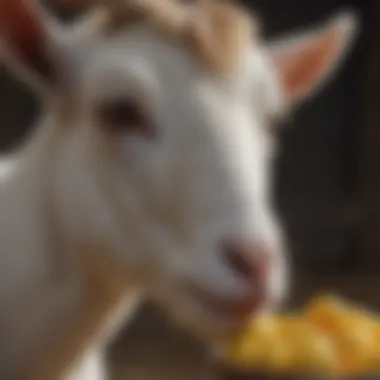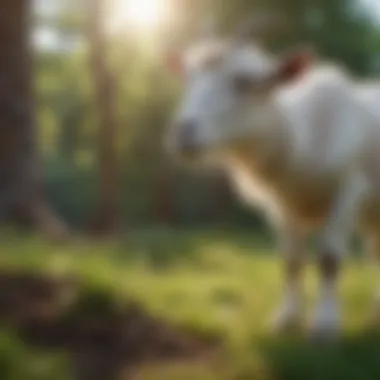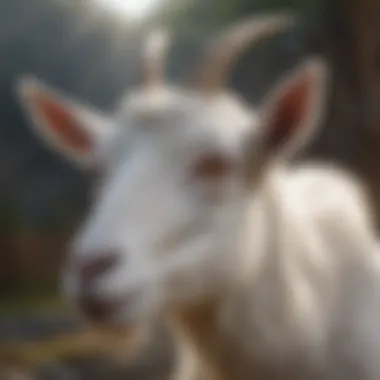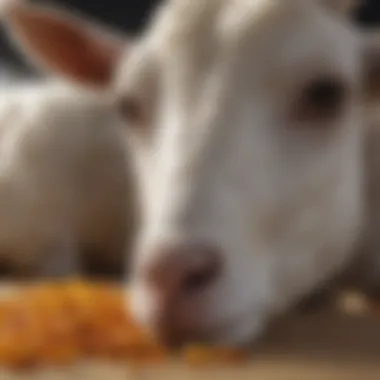Enhancing Goat Health with B Complex Vitamins


Intro
B complex vitamins are essential for maintaining optimal health and productivity in goats. These vitamins play crucial roles in various physiological processes, impacting everything from growth rates to reproductive performance. Understanding the importance of B complex vitamins can enable goat owners to make informed decisions about the diets of their herds. This article will explore the various aspects of B complex vitamins, including their sources, signs of deficiency, and recommended supplementation. By integrating this knowledge, goat owners can enhance both the welfare and productivity of their goats.
The Role of B Complex Vitamins in Goat Health
B complex vitamins encompass a range of vitamins that are vital for numerous biochemical functions. Each B vitamin, including B1 (thiamine), B2 (riboflavin), B3 (niacin), B5 (pantothenic acid), B6 (pyridoxine), B7 (biotin), B9 (folate), and B12 (cobalamin), contributes uniquely to the health of goats. They support energy production, weight gain, and overall metabolic processes. Particularly during growth periods and reproductive cycles, adequate B vitamin intake becomes crucial for both does and bucks.
Consequences of B Complex Vitamin Deficiency
Deficiencies in B complex vitamins can lead to a series of health concerns in goats. Common signs include:
- Poor growth rates
- Reproductive failure
- Weakness or lethargy
- Neurological issues, such as incoordination
Recognizing these signs early can be key to preventing further health complications. Offering a balanced diet that includes sufficient sources of B complex vitamins can mitigate these risks.
Sources of B Complex Vitamins
Goat diets can be supplemented with natural sources of B complex vitamins. Common sources include:
- Legume hay: Richer in B vitamins than grass hays.
- Grains: Corn, barley, and oats contain vit B1 and B6.
- Certain vegetables and fruits: Potatoes, carrots, and apples can provide B vitamins.
- Commercial supplements: Products designed specifically for goats can ensure appropriate vitamin intake.
Recommended Supplementation Methods
When it comes to ensuring that goats receive adequate B complex vitamins, several methods can be adopted:
- Direct supplementation: Adding specific vitamin preparations to feed.
- Mineral blocks: Some blocks contain essential vitamins along with minerals.
- Liquid supplements: Available commercially for easy administration.
Consulting with a veterinarian can aid in choosing the most suitable option for specific herd needs.
The End
In summary, B complex vitamins play an indispensable role in promoting goat health and productivity. By understanding their importance, recognizing deficiency signs, and providing adequate dietary sources, goat owners can significantly enhance the welfare of their herds. Knowledge is key – and with the right information, higher productivity and better health outcomes are achievable.
Understanding B Complex Vitamins
B complex vitamins play a crucial role in the health and productivity of goats. These vitamins consist of a group of water-soluble vitamins that work together to maintain several essential bodily functions. Understanding their composition and how they function is key for goat owners who seek to ensure optimal animal health and performance.
Definition and Composition
B complex vitamins include a variety of essential nutrients such as B1 (thiamine), B2 (riboflavin), B3 (niacin), B5 (pantothenic acid), B6 (pyridoxine), B7 (biotin), B9 (folic acid), and B12 (cobalamin). Each vitamin has a unique structure and function, collectively supporting numerous processes in goat metabolism. For example, thiamine helps in carbohydrate metabolism, while cobalamin is crucial for red blood cell formation and neurological function.
These vitamins are often found in complex forms in feeds, which can include grains, forages, and supplements. Their significance extends to not just sustaining life but enhancing growth, reproduction, and overall health outcomes for goats. Thus, an adequate supply of B complex vitamins is non-negotiable for successful goat farming.
Functions of B Complex Vitamins
Each B vitamin contributes uniquely to the overall health and functioning of goats. Some key functions include:
- Energy metabolism: B1, B2, B3, and B5 are pivotal for converting feed into energy, supporting growth and productivity.
- Nervous system health: Vitamins like B1 and B12 play vital roles in maintaining a functional nervous system.
- Cellular production: B9 and B12 are essential for DNA synthesis, crucial for cell reproduction.
- Skin and coat health: Biotin, or B7, is known to support skin integrity and coat condition, affecting the general health appearance of goats.
In summary, B complex vitamins are not mere dietary additions; they are substantial components of a goat's health and productivity framework. Ensuring that goats receive a well-balanced diet that contains adequate amounts of these vitamins will foster not only their development but also the efficiency of their metabolic processes.
Important: Goat owners should regularly assess dietary sources and consider supplementation if deficiencies are suspected.
The Role of B Complex Vitamins in Goat Health


B complex vitamins play a crucial role in maintaining the health and productivity of goats. These vitamins are essential for various physiological functions, significantly impacting growth, reproductive capability, and overall metabolic efficiency. Understanding how B complex vitamins contribute to goat health can aid farmers and breeders in optimizing their dietary strategies.
Growth and Development
The importance of B complex vitamins in goat growth and development cannot be overstated. Vitamins such as B1 (thiamine), B2 (riboflavin), and B12 (cobalamin) are vital for cellular development and energy production. Thiamine, for example, is necessary for glucose metabolism, providing the necessary energy for growing goats.
Moreover, B complex vitamins participate in DNA synthesis and cell division, which are fundamental for the growth of muscle and bone. Deficiencies can present as stunted growth or delayed maturation in young goats. Providing adequate amounts of these vitamins in their diet can ensure that young goats reach their growth potential effectively.
Reproductive Health
Reproductive health is another critical aspect influenced by B complex vitamins. Vitamin B9, or folate, plays a key role in fetal development and reproductive health. It supports the formation of genetic material and helps in the proper functioning of reproductive organs. In females, adequate folate levels are associated with healthier pregnancies and reduced risk of birth defects.
In males, B vitamins contribute to improved sperm quality and overall fertility. A well-balanced diet with sufficient B complex vitamins can lead to better reproductive outcomes, increasing the chances of successful breeding and healthier offspring. Therefore, goat farmers must monitor and adjust B complex vitamin intake during breeding seasons.
Metabolic Processes
B complex vitamins are integral to various metabolic processes in goats. They facilitate enzymatic reactions that are crucial for transforming nutrients into energy. For instance, niacin (B3) is vital for fat metabolism, while pyridoxine (B6) assists in amino acid metabolism.
All these vitamins together support the overall metabolic pathway, thus affecting growth rate and feed efficiency.
When goats receive adequate amounts of these vitamins, they may exhibit improved feed conversion ratios, leading to better weight gain and productivity. Conversely, deficiencies can lead to metabolic disorders, which could hamper growth and health.
In summary, B complex vitamins serve multiple functions that are essential for the health and productivity of goats. Their role in growth, reproductive health, and metabolic processes demonstrates the necessity of including them in a goat's diet. By ensuring goats receive adequate levels of B complex vitamins, owners can enhance their livestock's health and productivity.
Sources of B Complex Vitamins for Goats
Understanding where B complex vitamins come from is crucial for goat owners. Ensuring that goats receive adequate amounts of these vitamins is as important as recognizing their functions. This section covers both natural dietary sources and commercial supplements that can help enhance the intake of B complex vitamins in goats.
Natural Dietary Sources
Goats are natural foragers, and their diet varies significantly depending on their environment. They tend to consume a wide range of plants, which can impact their overall vitamin intake. Here are some significant natural sources of B complex vitamins for goats:
- Forage and Hays: Fresh forage is one of the primary sources of B vitamins for goats. High-quality pasture grass, clovers, and legumes are excellent choices. These forages typically contain thiamine, riboflavin, and niacin.
- Grains: Oats, barley, and corn are commonly used grains that provide a good amount of B vitamins, especially when they are in unprocessed forms. Ensuring goats have access to these grains can help meet their B vitamin needs.
- Fruits and Vegetables: Certain fruits and vegetables can be included as treats or supplements to enhance vitamin intake. Foods like carrots and apples contain B vitamins along with additional nutrients.
- Brewer’s Yeast: This is an excellent natural source of various B vitamins. Adding brewer’s yeast to the diet can compliment the B vitamin intake, notably thiamine and niacin.
When focusing on natural dietary sources, it is essential to monitor the quality of the forage and ensure that goats have a balanced diet. Deficiency can arise if they do not have access to a varied and nutrient-rich diet.
Commercial Supplements
In some cases, natural dietary sources may not provide sufficient B complex vitamins. This is where commercial supplements become valuable. They can play a significant role in ensuring optimal health and productivity in goats. Here are key points about commercial supplements:
- Types of Supplements: Various formulations are available, including powders, pellets, and liquids. Each type has specific advantages depending on how goats are being fed. For instance, powders can be easily mixed with grain, while liquids can be given via syringes for easy administration.
- Convenience and Efficiency: Using supplements can help goat owners avoid deficiencies that may arise due to inadequate dietary sources. They enable precise dosing and are especially useful during breeding, pregnancy, and lactation periods.
- Multi-Vitamin Formulas: Some products include a full range of vitamins and minerals, providing not just B complex vitamins but also other essential nutrients. Ensure the chosen product aligns with the goats' specific needs and health objectives.
- Quality and Sourcing: It is crucial to choose reputable brands that provide high-quality supplements. Reading reviews and doing research about the suppliers can ensure you make an informed decision.
Remember: Always consult with a veterinarian before starting any supplementation program. This will help tailor the approach based on the goat's health status and nutritional requirements.
Signs of B Complex Vitamin Deficiency
Understanding the signs of B complex vitamin deficiency in goats is crucial for ensuring their overall health and productivity. Detecting these deficiency signs early can help prevent serious health issues that may hinder growth, reproduction, and milk production. By recognizing the symptoms, goat owners can take prompt action to address the deficiencies, ensuring that their animals thrive.
Physical Symptoms
Physical symptoms of B complex vitamin deficiency can be varied. Common indications include weakness, poor coat condition, and reduced growth rates. Some specific signs to look out for include:
- Loss of appetite: A decline in the desire to eat can signal nutritional deficiencies.
- Poor weight gain: Goats failing to gain weight adequately, despite adequate feeding, may have underlying deficiencies.
- Skin issues: Rashes, lesions, or hair loss can appear when goats lack essential B vitamins.
- Neurological problems: Symptoms like uncoordinated movements or trembling can arise from deficiencies in vitamins like B1 (Thiamine) and B12 (Cobalamin).
"Identifying physical symptoms early on can save time, resources, and improve the welfare of goats in one's care."


These physical manifestations can greatly affect the productivity of the herd, resulting in reduced growth and lower milk yields. Owners should monitor their goats regularly, looking out for these signs to ensure timely intervention.
Behavioral Changes
Behavioral changes are also critical indicators of B complex vitamin deficiency. When goats are not receiving adequate B vitamins, alterations in behavior may be observed. Such changes include:
- Lethargy: A noticeable decrease in energy levels may indicate deficiencies. Goats that are usually playful might become inactive.
- Aggression: Some goats may show increased aggression or irritability when they lack certain B vitamins. This can stem from discomfort or pain associated with deficiencies.
- Social withdrawal: Goats are naturally social animals. A sudden retreat from social interactions may highlight an underlying health issue.
- Decreased milk production: Lactating does may show a drop in milk output, a direct effect on their health linked to nutrient deficiencies.
Understanding these behavioral changes can lead to better care practices and improved goat husbandry. Goat owners should observe their animals closely, taking notes on any irregularities to address potential deficiencies effectively.
Supplementation Guidelines for Goat Owners
Supplementation is a crucial aspect of maintaining the health and productivity of goats. It ensures that these animals receive the essential nutrients they may not obtain in sufficient quantities from their diet alone. This section addresses important elements, benefits, and considerations regarding supplementation guidelines specific to B complex vitamins for goat owners.
Determining Supplement Needs
It is important to assess the specific needs of each goat in a herd before deciding on supplementation. Factors such as age, size, reproductive status, and current health condition can influence the required levels of B complex vitamins. Here are some steps to guide goat owners:
- Conduct Nutritional Analysis: Analyze the current diet to identify any deficiencies, ensuring the inclusion of natural sources of B vitamins, such as grains, legumes, and green-forage.
- Observe Clinical Signs: Look for symptoms of deficiency, which may include fatigue, poor growth, or reproductive issues. These signs are critical indicators of whether supplementation is necessary.
- Consult with a Veterinarian: A veterinarian can provide valuable insights and recommend specific supplementation based on individual goat needs or herd requirements.
Methods of Administration
Once the need for supplementation is established, owners can choose how to administer B complex vitamins to their goats. There are various methods, each with its own advantages:
- Oral Administration: This is the most common method. B complex vitamins are available in liquid or powder forms that can be mixed with feed or given directly. This approach allows for easy integration into daily routines.
- Injectable Forms: In cases of severe deficiency, veterinary professionals may recommend injectable vitamins. This method provides rapid absorption and is optimal for goats that are ill or not eating well.
- Commercial Supplements: Many products combine B vitamins with other essential nutrients. They are designed for convenient use and targeted toward specific health goals.
Monitoring Health and Growth
Monitoring the impact of supplementation is vital to ensure its effectiveness and adapt to changing needs. Goat owners should establish a regular health check regimen that includes:
- Regular Weigh-ins: Track growth rates through consistent weight measurements to evaluate the effects of supplementation on development.
- Health Assessments: Regular veterinary check-ups can help assess overall health and well-being. This includes blood tests to measure vitamin levels and overall metabolic health.
- Behavioral Observations: Changes in behavior, such as increased activity level and improved feed intake, can indicate that supplementation is positively influencing health.
By closely monitoring these factors, goat owners can make informed adjustments to supplementation strategies, ensuring optimal health and productivity.
The effective supplementation of B complex vitamins is a multifaceted process that requires careful consideration of individual and herd needs, appropriate methods of delivery, and ongoing monitoring to achieve the best outcomes for goat health.
Potential Risks of Over-Supplementation
Supplementation of B complex vitamins is often seen as a straightforward solution to enhancing goat health. However, it is crucial to understand that over-supplementation brings its own set of risks. This section discusses the specific elements associated with excessive vitamin intake, benefits of proper balance, and considerations for maintaining goat health without causing harm.
Identifying Toxicity Symptoms
Over-supplementation can lead to toxicity, which manifests through various symptoms in goats. These symptoms can vary depending on which specific B vitamins are excessively present. Common signs of toxicity include:
- Loss of appetite: Goats may refuse to eat if overloaded with vitamins.
- Nausea or vomiting: Animals might show signs of distress.
- Diarrhea: An unsettled stomach can result in frequent loose stools.
- Nervous system issues: Symptoms such as weakness or tremors can occur, particularly with too much B6 or B12.
Identifying these symptoms early is crucial for preventing severe health issues. Regular observation of goat behavior and physical condition helps in confirming if a supplement regimen needs adjustment.
Balancing Nutrient Intake
Achieving a balance in nutrient intake is essential to ensure goats receive the necessary vitamins without suffering from the adverse effects of over-supplementation. A well-structured feeding plan can prevent both deficiencies and excesses. Here are several strategies to consider:
- Consult a veterinarian: Regular check-ups can help tailor supplementation to the specific needs of each goat.
- Observe body condition: Monitoring changes in weight and overall health can guide supplement adjustments.
- Use tested feed formulations: Commercial feeds are often formulated to provide optimal B vitamin levels without the risk of toxicity.
- Implement rotational grazing: This practice can enhance a goat's natural vitamin intake from forage, reducing the need for heavy supplementation.
It is important to remember that goats are sensitive to changes in their diet. An appropriate balance of nutrients is not only beneficial for their health but also enhances productivity.


"Balanced nutrient intake is the cornerstone of successful livestock management, ensuring health and productivity while minimizing risks."
Through careful planning and monitoring, goat owners can provide a diet that supports optimal health without the dangers posed by over-supplementation.
The Impact of B Complex Vitamins on Milk Production
The production of milk in goats is closely related to the presence of adequate levels of B complex vitamins. These vitamins are not just essential for the general health of the goats; they play a crucial role in influencing both the quantity and quality of milk produced. Understanding their impact is vital for goat farmers who strive for optimal herd performance.
Milk Quality
B complex vitamins contribute significantly to the nutritional profile of goat milk. Vitamins such as B2 (riboflavin) and B12 (cobalamin) help in the synthesis of proteins and fats, which are important components of milk. When goats have sufficient levels of these vitamins, the resulting milk is richer in essential nutrients, benefiting both the goat kids and the consumers of goat milk products.
Moreover, a deficiency in these vitamins can lead to milk that is lower in fat and protein content. This trait can affect cheese-making and other dairy processes that depend on the quality of milk. Thus, it’s essential to ensure that goats receive balanced amounts of B complex vitamins to maintain high standards in milk quality.
"Adequate B complex vitamins ensure that the milk produced by goats meets the quality expectations of consumers and industry standards."
Milk Quantity
In addition to quality, the overall quantity of milk produced by goats can be affected by B complex vitamins. These vitamins play a role in metabolism, energy production, and thus the overall efficiency of milk synthesis. For instance, vitamin B6 (pyridoxine) is crucial for protein metabolism, which is foundational for milk production. Goats lacking in sufficient levels of this vitamin may exhibit reduced milk yield.
Furthermore, vitamins like B1 (thiamine) help in energy metabolism, which is directly tied to the quantity of milk a goat can produce. When goats are well-nourished with B complex vitamins, they show improved productivity levels. Regular assessment of vitamin intake is advisable to prevent any dip in milk production due to deficiencies.
Research and Studies on B Complex Vitamins in Goats
Research on B complex vitamins plays a crucial role in enhancing goat health and productivity. Various studies have explored the effects of these vitamins on numerous aspects of goat life, from growth rates to reproductive health. Understanding these findings can help goat owners optimize their feeding strategies, leading to improved herd welfare and productivity.
Recent Findings
Recent studies have indicated that B complex vitamins significantly affect the metabolic processes in goats. For instance, Vitamin B1, or thiamine, has been shown to prevent neurological disorders in kids, which can stem from nutritional deficiencies. Researchers found that goats receiving adequate thiamine demonstrated better neurological function and growth patterns compared to those with insufficient levels.
Another notable study highlighted the role of Vitamin B12 in enhancing feed efficiency. Goats supplemented with Vitamin B12 exhibited improved weight gain and feed conversion ratios, suggesting that this vitamin plays a vital role in energy metabolism. Additionally, findings suggest B vitamins collectively may enhance the immune response in goats, further emphasizing their importance in the diet.
The implications of these studies are profound. They help in formulating diets that cater specifically to the needs of growing and lactating goats. Such studies underscore the need for periodic assessments of diet composition, especially in production settings.
Future Research Directions
While current research provides a wealth of information, there is still much to uncover about B complex vitamins. Future studies could explore the long-term effects of supplementation under various environmental conditions. For example, stress factors such as heat or cold can affect nutrient absorption. Understanding how these conditions impact vitamin needs is an area ripe for exploration.
Another avenue could be the impact of B complex vitamins on goat behavior and overall well-being. Behavioral responses to vitamin deficiency are less understood, and such knowledge could inform better husbandry practices. Assessing the interplay between B vitamins and microbial populations in the rumen might also offer insights into optimizing goat health.
Moreover, studies could focus on the efficacy of different sources of B complex vitamins, both natural and synthetic. Comparing the bioavailability of these vitamins could lead to more cost-effective supplementation strategies for goat farmers.
Culmination
In this article, we have delved into the critical role that B complex vitamins play in the health of goats. These vitamins are not merely optional nutrients; they are essential for maintaining optimal health and enhancing productivity in these animals. Understanding the specific benefits of each B vitamin can significantly aid goat owners in making informed dietary choices.
Key Elements of B Complex Vitamins
B complex vitamins include a range of vital nutrients such as B1 (thiamine), B2 (riboflavin), B3 (niacin), B5 (pantothenic acid), B6 (pyridoxine), B7 (biotin), B9 (folate), and B12 (cobalamin). Each of these vitamins contributes uniquely to various physiological processes:
- Growth and Development: B vitamins support cellular functions that promote growth in young goats.
- Reproductive Health: Proper levels of certain B vitamins can improve fertility and reproductive success.
- Metabolic Processes: They aid in energy production and nutrient metabolism, which are critical for overall health.
Benefits of Proper Supplementation
Supplementation of B complex vitamins can directly impact the health and productivity of goat herds. Creacting a balanced diet tailored to the specific needs of goats ensures that they receive adequate amounts of these vitamins. Benefits observed include:
- Enhanced growth rates
- Improved milk production
- Better reproductive performance
Considerations
While it’s evident that these vitamins are essential, it’s important to avoid over-supplementing. Adhering to recommended dosages based on veterinary guidance will prevent the risks associated with toxicity. Monitoring goats regularly for symptoms of deficiency or excess will lead to better management practices.
To summarize, understanding and implementing a comprehensive plan utilizing B complex vitamins is crucial for any goat owner aiming to elevate the performance and health of their animals. Through informed nutritional choices, one can foster a thriving herd that not only meets but exceeds productivity expectations.







